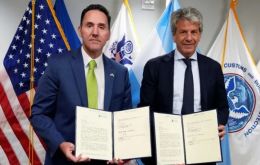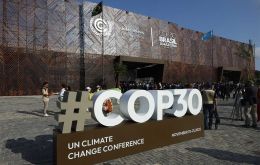MercoPress. South Atlantic News Agency
Stories for 2025
-
Saturday, November 22nd 2025 - 10:17 UTC
Argentina and US sign strategic customs agreement

Argentina's Customs Revenue and Control Agency (ARCA) and the US Customs and Border Protection (CBP) signed an agreement in Washington on Friday to deepen bilateral cooperation, improve border security, and streamline trade through smart controls and 100% digital processes involving automation and digitization of passenger and cargo traffic.
-
Saturday, November 22nd 2025 - 10:15 UTC
Arrest warrant against Betssy Chávez escalates Mexico-Peru standoff

Peruvian Supreme Court Justice Juan Carlos Checkley issued an arrest warrant against former Prime Minister Betssy Chávez, who is currently seeking asylum inside the Mexican Embassy in Lima. The move comes as the Peruvian government delays issuing the safe conduct pass required for her departure to Mexico, heightening diplomatic tensions between the two nations.
-
Saturday, November 22nd 2025 - 10:04 UTC
Trump and Mamdani agree to cooperate for the sake of New York

US President Donald Trump met with New York Mayor-elect Zohran Mamdani at the White House on Friday, putting aside weeks of fierce public antagonism to promise cooperation on an agenda focused on affordability and public safety for the city.
-
Saturday, November 22nd 2025 - 10:00 UTC
Gigantic, sustainable ship makes landmark call in Montevideo

The Port of Montevideo achieved a major operational milestone on Friday by receiving the largest vessel ever to arrive in Uruguay's history, reaffirming the port's strategic importance as a regional hub.
-
Saturday, November 22nd 2025 - 09:57 UTC
Orsi praises Uruguay's global trade State policy
![Lacalle Pou “always told me that [the CPTPP] was a good tool and that it was good to move forward with it,” Orsi explained](/data/cache/noticias/107909/260x165/ya.jpg)
Uruguayan President Yamandú Orsi celebrated his country's accession to the Comprehensive and Progressive Agreement for Trans-Pacific Partnership (CPTPP), emphasizing that the achievement was the result of sustained diplomatic effort and represents a crucial “state policy” that transcends party lines.
-
Saturday, November 22nd 2025 - 09:56 UTC
Chile launches “Cherry Express” to China season

Chile has officially begun its 2025-2026 fresh cherry export season by sea, with the first dedicated “Cherry Express” ships sailing directly from the Port of San Antonio to China this week. The season is heavily reliant on the Asian market, which purchases approximately 93% of all Chilean cherry exports.
-
Saturday, November 22nd 2025 - 09:54 UTC
Embarrassing: Paraguayan gov't builds bridge inside private property

Paraguay's Ministry of Public Works and Communications (MOPC) was involved in a shameful scandal after one of the bridges of a road under construction wound up within private property, it was reported Friday in Asunción.
-
Saturday, November 22nd 2025 - 08:00 UTC
No consensus yet at COP30

As the 30th UN Climate Change Conference (COP30) reached its scheduled closing time of 11:50 PM on Friday, negotiations for the final document, known as the Belém Package, had not concluded. Talks were expected to extend into the early hours of Saturday.
-
Saturday, November 22nd 2025 - 07:47 UTC
Boric rebukes Trump's instructions to single out countries endorsing progressive agendas

Chilean President Gabriel Boric Font strongly rebuked US President Donald Trump's instructions to American embassies to “take note” of countries whose authorities promote or finance diversity, abortion, and euthanasia policies. “Chile accepts no form of tutelage. Our sovereignty is not negotiable,” the South American leftwing leader wrote on social media on Friday.
-
Friday, November 21st 2025 - 19:17 UTC
Bolivia: Rift between President Paz and Vice President Lara denied

Bolivia's Presidential Spokesperson Carla Faval on Friday denied the existence of a rift between President Rodrigo Paz Pereira and Vice President Edmand Lara, asserting that the speculation about internal tension “does not correspond to a real state.”
